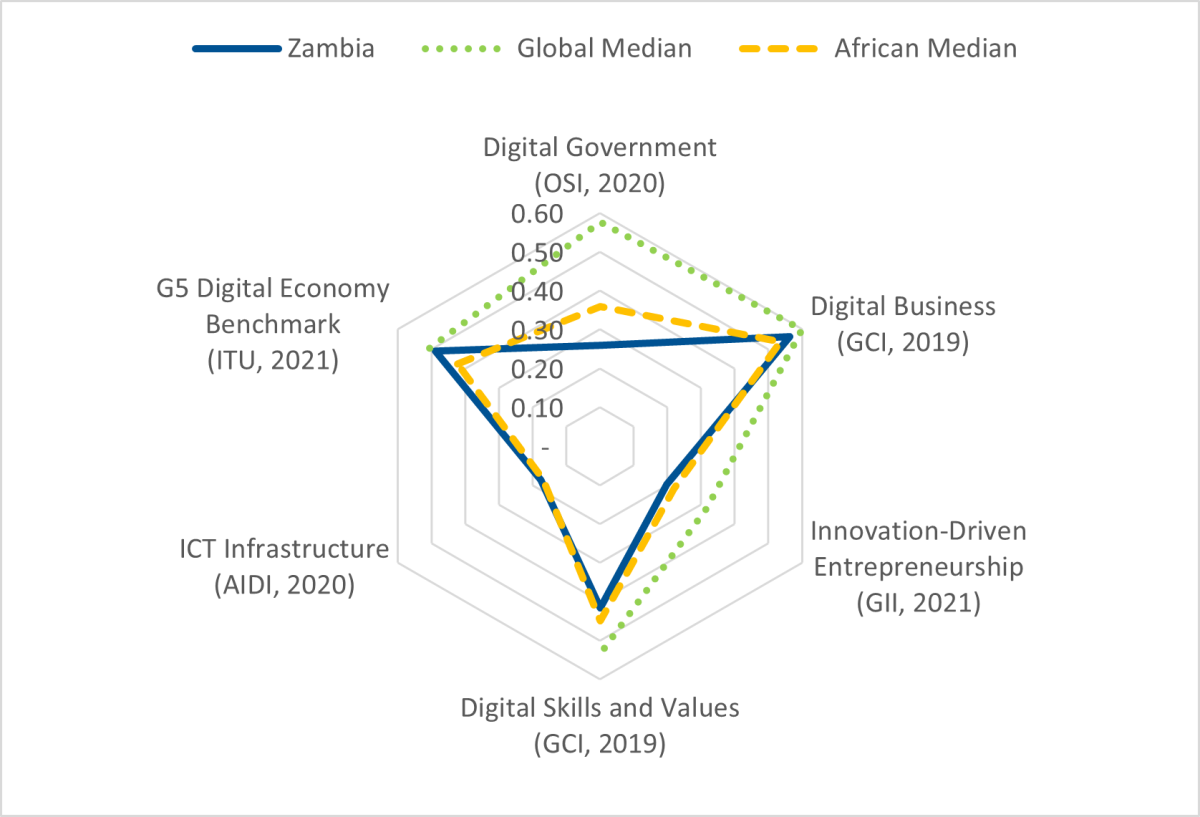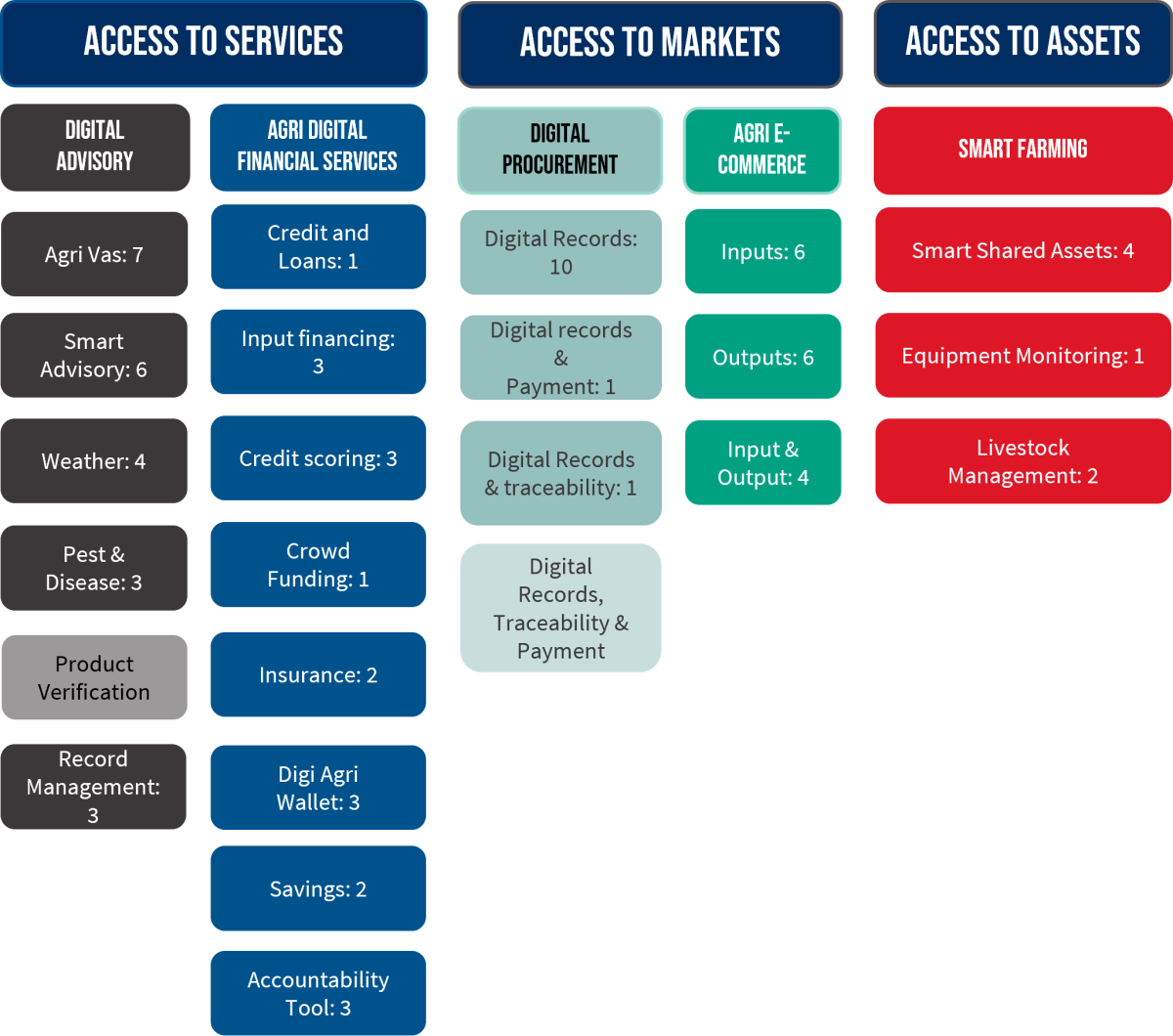Caption: Interactive map presenting country specific data, including universities and incubators contacted for the study and the digital innovations identified at the time of the study
Full country profile (PDF)
Zambia Ranked 10 out of 16 Countries in the Benchmark
The benchmark assessment reflects the extent to which Zambia is unlocking positive pathways towards a digital economy and supporting a vibrant ecosystem of different actors.

Caption: Results from Benchmark Assessment for Zambia
Zambia ranked 10 out of 16 in the benchmark assessment which suggests that it has some key foundational elements necessary for a robust digital economy.
Zambia ranked in the middle of the SADC member states for most pillars except digital government (which identifies the presence and use of digital services and platforms to enable public service delivery) where it ranked 14.
Zambia ranked highest (4) in the digital business pillar (which identifies the development of a robust marketplace for digital trade, digital financial services, and digital content).
| Group | Country | Benchmark Index Score (Adjusted) | Overall Benchmark Ranking |
|---|---|---|---|
| 1 | South Africa | 0.5891 | 1 |
| Mauritius | 0.5839 | 2 | |
| Seychelles | 0.5155 | 3 | |
| Global Median | 0.5064 | ||
| 2 | Eswatini | 0.4222 | 4 |
| Tanzania | 0.4138 | 5 | |
| Botswana | 0.4114 | 6 | |
| 3 | Zimbabwe | 0.3895 | 7 |
| Namibia | 0.3809 | 8 | |
| Lesotho | 0.3802 | 9 | |
| African Median | 0.3595 | ||
| Zambia | 0.3506 | 10 | |
| Malawi | 0.3483 | 11 | |
| Madagascar | 0.3005 | 12 | |
| 4 | Angola | 0.2985 | 13 |
| Mozambique | 0.2919 | 14 | |
| DR Congo | 0.2782 | 15 | |
| Comoros | 0.2497 | 16 |
Caption: Overall Benchmark Assessment Results and Rank for all SADC member states
For further information on the benchmark results and regional trends please read the Situational Analysis Report.
Zambia is Taking an Agile Approach to Updating Digitalization Policies and Strategies
The baseline of national policies and strategies identified that digitalization is being prioritized in Zambia, with a few national documents published more recently (2021).
Of particular interest is the efforts that Zambia has made to publish updated versions of documents, such as the ICT Policy, to incorporate more focus on emerging technologies and the risks associated with greater digitalization, security, and privacy.
This kind of agile approach is needed when attempting to transform to a digital economy to keep pace with the changing nature of technologies and risks associated with digital transformation.
Policies require implementation to promote entrepreneurship and increase access to capital so that solutions can be developed across the economy.
26 Innovations were Identified in Zambia with Digital Advisory the Most Common Solution
All use cases were present in Zambia: digital advisory, agri-digital financial services, digital procurement, agri e-commerce and smart farming. The majority addressed digital advisory or digital procurement.

Caption: Diagram illustrating number of identified innovations and their sub use case solutions.
Innovations in Zambia are present throughout the value chain but more common in the earlier stages of the value chain: on-farm production, planning, inputs and access to markets.

Caption: Diagram illustrating number of innovations identified in each phase of the value chain.
The biggest challenge for innovators in Zambia is scaling up their innovations from a proof-of-concept phase. Innovators rely heavily on donor grants for investment or funding from friends and family.
Institutions Require Better Equipment to Train Students in Agri-Entrepreneurship
Enhancing agri-entrepreneurship with necessary technology and equipment will enable universities to provide a more consistent and updated curricula on digital agricultural skills and prepare the trainers and teachers with new methodologies and contents.
Universities in Zambia would benefit from sharing curricula with their peers in the region so that they collaborate to strengthen their curricula for digital agriculture.
Shared infrastructure through the local national research and education network (ZAMREN) or selected centers could cut down costs of each university purchasing its own equipment.
Icons - credit to NounProject https://thenounproject.com/






